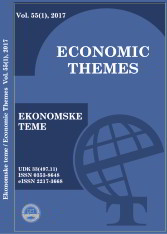Economic Themes (2017) 55 (1) 6, 89-103
Paşa Mustafa Özyurt, Kemal Kantarcı
Abstract: Being green and being an economically successful and competitive destination has been the core topic in the sustainable development literature in recent years. The link between sustainability and competitiveness in the market is fairly important to study in the tourism industry in order to support and encourage decision makers and stakeholders in their decisions. In this sense, this study has two aims. First aim is to cluster European countries based on their sustainability scores reported in World Economic Forum’s Global Competitiveness Index. Second aim is to reveal the intervening role of competitiveness on the relationship between sustainability and tourism performance for European countries. We employed a K-means cluster analysis and several multiple regression analyses. Analyses results revealed three clusters for European countries. Another finding postulated that competitiveness of these countries have been influenced by their level of sustainability. Our final finding posits that tourism performance of these countries in terms of tourist arrivals and tourism receipts has been found to be impacted by the level of tourism competitiveness.
Keywords: sustainability; tourism competitiveness; global competitiveness; tourism performance; European countries
THE INTERVENING ROLE OF COMPETITIVENESS ON THE RELATIONSHIP BETWEEN SUSTAINABILITY AND TOURISM PERFORMANCE: A RESEARCH ON EUROPEAN COUNTRIES
Paşa Mustafa Özyurt, Kemal Kantarcı
Abstract: Being green and being an economically successful and competitive destination has been the core topic in the sustainable development literature in recent years. The link between sustainability and competitiveness in the market is fairly important to study in the tourism industry in order to support and encourage decision makers and stakeholders in their decisions. In this sense, this study has two aims. First aim is to cluster European countries based on their sustainability scores reported in World Economic Forum’s Global Competitiveness Index. Second aim is to reveal the intervening role of competitiveness on the relationship between sustainability and tourism performance for European countries. We employed a K-means cluster analysis and several multiple regression analyses. Analyses results revealed three clusters for European countries. Another finding postulated that competitiveness of these countries have been influenced by their level of sustainability. Our final finding posits that tourism performance of these countries in terms of tourist arrivals and tourism receipts has been found to be impacted by the level of tourism competitiveness.
Keywords: sustainability; tourism competitiveness; global competitiveness; tourism performance; European countries

